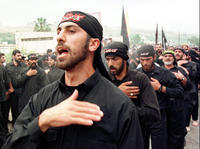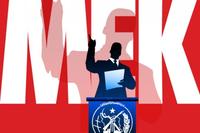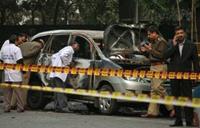-
U.S. Congressman: Hezbollah greater threat than al Qaeda

Al Qaeda is perceived as the primary terror threat to the United States, but Congressman Peter King (R-New York), chairman of the House Homeland Security Committee, sounds the alarm that Hezbollah may be the greater threat
-
-
U.S, Israel employ shady organization against Iran

Analysts have concluded that the United States and Israel may be in a strategic alliance with a former left-wing Iranian political group instrumental in the 1979 Islamic Revolution and the overthrow of Shah Rezi Pahlavi; the purpose of the alliance is to destabilize the current regime in Iran
-
-
Killer silk kills anthrax, other microbes dead
A simple, inexpensive dip-and-dry treatment can convert ordinary silk into a fabric that kills disease-causing bacteria — even the armor-coated spores of microbes like anthrax — in minutes
-
-
U.K. worried about dirty bombs

U.K. deputy prime minister Nick Clegg warned that materials to make a dirty bomb are readily available – so much so, that police forces cannot hope to contain such a threat; “That is a stateless threat, impossible for any national police force, no matter how advanced, to contain,” he said
-
-
Armed pilot program budget to be slashed in half

The Obama administration’s budget proposes cutting more than half the funding for a program that trains airline pilots to wield guns in the event of a terrorist takeover; the program is voluntary and consists of an intensive eight-day training course and a recurring training every six months; thousands of U.S. airline pilots have been trained to carry weapons as a final line of defense against terrorism
-
-
Making bus transportation more secure: Learning from Israel’s experience
A new report on ground transportation security draws on the experience of Israel with Palestinian terrorists’ attacks on buses; the report helps increase understanding of what can happen and of what can deter, prevent, and mitigate terrorist attacks against bus transit
-
-
FBI increasingly concerned with “sovereign citizen” movement

Over the past decade, the FBI has grown increasingly concerned with the “sovereign citizen” movement; since 2000, sovereign citizens have killed six police officers and violent battles with law enforcement agents are on the rise; the U.S. National Counterterrorism Center classified the movement as a major threat alongside Islamic extremism
-
-
The challenge of fighting Lashkar-e-Toiba
In her debut guest column, Bidisha Biswas, an associate professor of political science at Western Washington University, explores the threat that Lashkar-e-Toiba poses to the United States as well as India and Pakistan and what can be done to stop the extremist group
-
-
SOUTHCOM deploys radar that sees through foliage, rain, darkness, and dust storms
Lockheed Martin’s TRACER is a light weight, low-frequency synthetic-aperture radar that can peer through foliage, rain, darkness, dust storms, or atmospheric haze to provide real-time, high-quality tactical ground imagery; U.S. Southern Command has just deployed the penetrating radar to support the Command’s counter-terrorism and humanitarian assistance missions, and disaster relief operations
-
-
Police wary of suicide attempts at 9/11 memorial

Aside from the threat of terrorism, the New York City Police Department worries about the risks of suicide at the national 9/11 memorial; The memorial is focused around two sunken granite pools where the World Trade Center towers once stood; some fear that visitors, so overcome by grief, may attempt to commit suicide by throwing themselves into the pools
-
-
Thwarting the botulinum neurotoxin
The botulinum neurotoxin is the most poisonous substance known to man, causing botulism; it can be used by terrorists for deadly attacks; the toxin paralyzes muscle cells by disrupting their connections with the nerves that tell them how and when to move
-
-
DHS secretary expresses “concerns” over Iranian threats

Following recent attacks on Israeli officials overseas thought to be perpetrated by Iran and its proxies, DHS secretary Janet Napolitano expressed her concern over potential threats from Iran to domestic targets; speaking before a House panel, Fox Newsreported, Napolitano said the potential for an Iranian attack is “a situation that bears watching.”
-
-
U.S. places terror sanctions on Iranian spy ministry

On Thursday the U.S. Treasury Department announced that it had placed sanctions on Iran’s Ministry of Intelligence and Security, accusing it of supporting terrorism, committing human rights abuses against Iranians, and participating in the ongoing suppression of protests in Syria
-
-
Court: Malaysian woman can sue DHS over No-Fly List

A U.S. appeals court has cleared the way for a Malaysian woman to file a lawsuit against DHS and the FBI for mistakenly placing her on the No-Fly List and arresting her at San Francisco International Airport in 2005; Rahinah Ibrahim, who has never been accused of any crimes, was arrested and placed in a holding cell for two hours
-
-
New crime-fighting methods to deter, nab terrorists
The goal of an emerging field in forensics — chemical forensics — is to use the technology of chemistry to trace weaponized toxic substances and related materials back to their source
-
- All
- Regional
- Water
- Biometrics
- Borders/Immig
- Business
- Cybersecurity
- Detection
- Disasters
- Government
- Infrastructure
- International
- Public health
- Public Safety
- Communication interoperabillity
- Emergency services
- Emergency medical services
- Fire
- First response
- IEDs
- Law Enforcement
- Law Enforcement Technology
- Military technology
- Nonlethal weapons
- Nuclear weapons
- Personal protection equipment
- Police
- Notification /alert systems
- Situational awareness
- Weapons systems
- Sci-Tech
- Sector Reports
- Surveillance
- Transportation
Advertising & Marketing: advertise@newswirepubs.com
Editorial: editor@newswirepubs.com
General: info@newswirepubs.com
2010-2011 © News Wire Publications, LLC News Wire Publications, LLC
220 Old Country Road | Suite 200 | Mineola | New York | 11501
Permissions and Policies
Editorial: editor@newswirepubs.com
General: info@newswirepubs.com
2010-2011 © News Wire Publications, LLC News Wire Publications, LLC
220 Old Country Road | Suite 200 | Mineola | New York | 11501
Permissions and Policies
